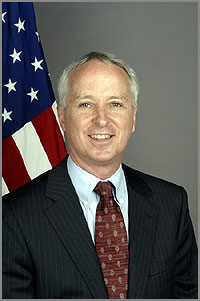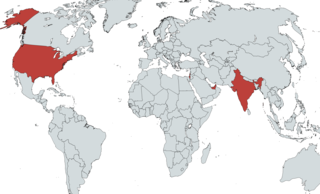In international relations, public diplomacy broadly speaking, is any of the various government-sponsored efforts aimed at communicating directly with foreign publics to establish a dialogue designed to inform and influence with the aim of building support for the state's strategic objectives. These also include propaganda. As the international order has changed over the twentieth century, so has the practice of public diplomacy. Its practitioners use a variety of instruments and methods ranging from personal contact and media interviews to the internet and educational exchanges.

West York Island, also known as Likas Island, and several other names. With an area of 18.6 hectares, it is the third largest of the naturally occurring Spratly Islands, and the second largest of the Philippine-occupied islands. It is 530 yards (485 m) wide, 330 yards (302 m) long, and its highest elevation is 30 feet (9 m).

The International Institute for Applied Systems Analysis (IIASA) is an independent International research institute located in Laxenburg, near Vienna in Austria, founded as an East-West scientific cooperation initiative during the Cold War. Through its research programs and initiatives, the institute conducts policy-oriented interdisciplinary research into issues too large or complex to be solved by a single country or academic discipline. These include climate change, energy security, population aging, and sustainable development. The results of IIASA research and the expertise of its researchers are made available to policymakers worldwide to help them make informed and evidence-based policies.
Kenneth Guy Lieberthal is an American professor and politician known as an expert on Chinese politics, political economy, domestic and foreign policy, and on the evolution of US-China relations.
Ira David Wallach was an American businessman and philanthropist. He was head of Central National-Gottesman, the largest privately held marketer of paper and pulp products.

The Prague Security Studies Institute is a non-profit, nongovernmental organization established in early 2002 to advance the building of a just, secure, democratic and free-market society in the Czech Republic and other post-communist states. PSSI’s primary mission is to build an ever-growing number of informed and security-minded policy practitioners dedicated to the development and safeguarding of democratic institutions and values in the Czech Republic and its regional neighbors. PSSI works to identify and analyze select foreign policy and security-related concerns in transatlantic relations and other theaters of the world, propose sound, achievable policy responses and host regular roundtables and major conferences on these topics. PSSI is especially alert to the intersection of global finance/energy and national security considerations.

Cameron Munter is a retired American diplomat, academic, and executive who now works as a global consultant. He was President and CEO of the EastWest Institute (EWI) in New York from 2015 to 2019, directing conflict resolution projects in Russia, China, the Middle East, South Asia, and the Balkans. He is currently a senior fellow of the CEVRO Institute in Prague and the Atlantic Council in Washington, and serves on a number of corporate and nonprofit boards.
In international relations, the term smart power refers to the combination of hard power and soft power strategies. It is defined by the Center for Strategic and International Studies as "an approach that underscores the necessity of a strong military, but also invests heavily in alliances, partnerships, and institutions of all levels to expand one's influence and establish legitimacy of one's action."

Democracy promotion by the United States aims to encourage governmental and non-governmental actors to pursue political reforms that will lead ultimately to democratic governance.
John Edwin Mroz was the founder, president, and CEO of the EastWest Institute, best known for his diplomatic efforts in the Israeli-Palestinian conflict.
The Fletcher School of Law and Diplomacy is the graduate school of international affairs of Tufts University, in Medford, Massachusetts. Fletcher is one of America's oldest graduate schools of international relations. As of 2017, the student body numbered around 230, of whom 36 percent were international students from 70 countries, and around a quarter were U.S. minorities.
Science diplomacy describes how scientific exchanges and the cross-border collaboration of scientists or scientific organizations can perform diplomatic functions in the context of international relations. Most often this diplomacy happens as part of scientific cooperation as a means of building relationships between states and within international organizations. Science diplomacy is a process by which states, international organizations and non-state actors represent themselves and their interests. It is a global phenomenon.

Tewodros Ashenafi is an Ethiopian entrepreneur. He is CEO of SouthWest Energy.

Sean M. Joyce was the 14th Deputy Director of the Federal Bureau of Investigation.

Alan Michael Wachman was a scholar of East Asian politics and international relations, specializing in cross-strait relations and Sino-U.S. relations. He was a professor of international politics at The Fletcher School of Law and Diplomacy, Tufts University. Previously he had been the co-director of the Johns Hopkins University-Nanjing University Center for Chinese and American Studies in the PRC, and the president of China Institute in America.

The National Initiative for Cybersecurity Education (NICE) is a partnership between government, academia, and the private sector focused supporting the country's ability to address current and future cybersecurity education and workforce challenges through standards and best practices. NICE is led by the National Institute of Standards and Technology (NIST) in the U.S. Department of Commerce.
Peacebuilding in Jammu and Kashmir includes confidence-building measures at a nation-state level between the governments of India and Pakistan, track two diplomacy, as well as initiatives by non-governmental organisations (NGOs), institutes and individuals. The purpose of peacebuilding in Jammu and Kashmir include conflict prevention and reduction of hostilities in the Kashmir Valley. Many countries such as Russia, United States and China have also played a de-escalatory role with regard to tensions in the region.
Energy diplomacy is a form of diplomacy, and a subfield of international relations. It is closely related to its principal, foreign policy, and to overall national security, specifically energy security. Energy diplomacy began in the first half of the twentieth century and emerged as a term during the second oil crisis as a means of describing OPEC's actions. It has since mainly focused on the securitization of energy supplies, primarily fossil fuels, but also nuclear energy and increasingly sustainable energy, on a country or bloc basis.
The grey-zone describes the space in between peace and war in which state and non-state actors engage in competition.

The Indo-Abrahamic Alliance sometimes known as The Indo-Abrahamic Block or The Middle East QUAD or The Western QUAD or West Asian QUAD or I2-U2 is a geostrategic term coined by the foreign policy thinker and grand strategist Mohammed Soliman in use for a long essay for the Middle East Institute. The Indo-Abrahamic term refers to the growing convergence of geopolitical interests among India, Israel, and the United Arab Emirates, which will create a regional bloc that would include Egypt and Saudi Arabia and eventually fill in the gap left by a future US withdrawal from the Middle East and represents a counterbalance to Turkey and Iran. The Biden Administration later adopted Soliman's Indo-Abrahamic concept by launching the I2U2 Group in October 2021, which was followed by a leaders-level summit in July 2022.










